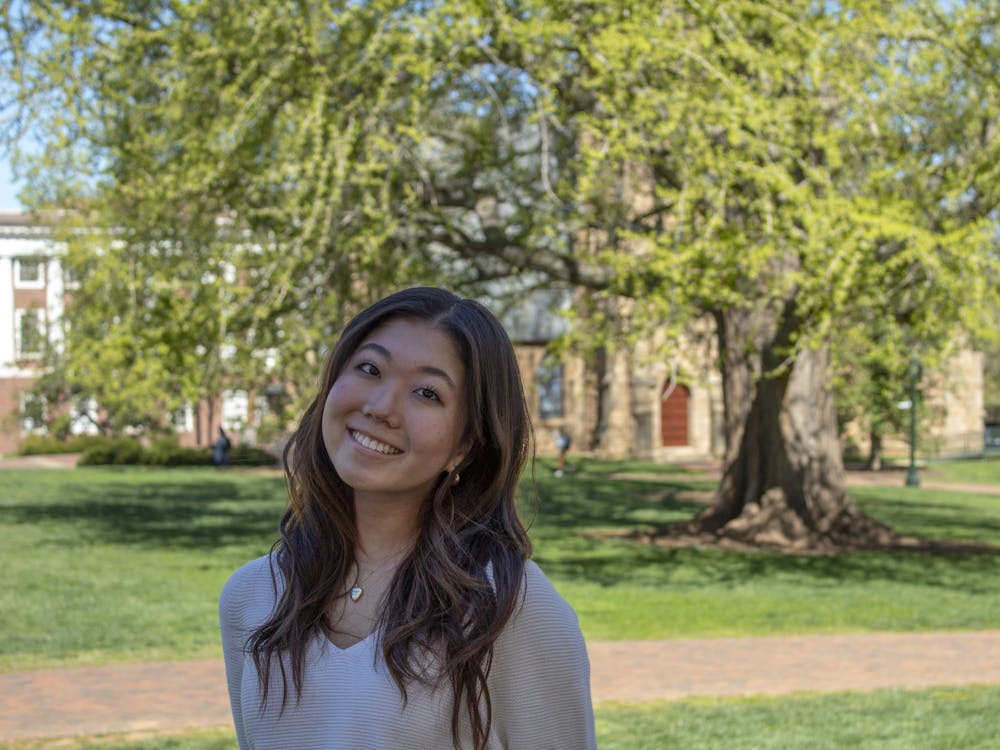Sitting outside on a Friday afternoon in November, Mempo Giardinelli's gray beard is lit by sunshine coming through the few remaining leaves on the trees. He looks toward the sidewalk and waves "hola" to a passing student.
Giardinelli, who will soon return to Resistencia, his home in the Chaco province of northern Argentina, has been a visiting professor this semester in the Department of Latin American Studies. He may be a long way from where he lives, but Giardinelli calls Charlottesville his otra casa, his other home.
"I've always liked it here," he said, smiling. "Charlottesville is a great place, with the advantages of both a small town and a big city."
This isn't the first time Giardinelli has taught at the University. He has been a visiting professor twice before, and he's glad to be back.
"The people here are very friendly," he said, raising his eyebrows. "The faculty here is at a very high level, and I am lucky to be part of one of the best departments in the country."
Fernando Oper
, director of the Latin American Studies program, also appreciates having Giardinelli here. He and Giardinelli met about 15 years ago when a student from Uruguay suggested Oper
invite him to speak at the University. From the time the two first met, Oper
was impressed by Giardinelli, and he and other faculty members began to talk about the possibility of having him return as a visiting professor.
"It's easy to get caught up in an intellectual vision of Latin America," Oper
said. "So it's important to bring people to the department who are actually in touch with reality there."
Giardinelli first came to the University in 1988, and he returned in 1997. According to Oper
, however, bringing him here this semester proved more difficult than in the past. Oper
was able to secure some funding from the International Studies Office, but the Dean's Office was unable to provide financial support because of budget cuts.
Realizing the importance of ensuring Giardinelli's voice reach students, Oper
spoke directly to University President John T. Casteen III, who was able to help obtain the money necessary for Giardinelli to return as a visiting professor.
In the past, the Spanish and Latin American Studies departments have hosted various visiting professors, including writers such as Isabel Allende from Chile and Antonio Cisneros from Peru.
"Visiting professors can bring so many things," Oper
said. "They make Latin America more real."
As a visiting professor, Giardinelli realizes he can bring a different point of view to his classes.
"I hope to bring to the students here an accurate depiction of life in Latin America," he said.
But he acknowledges that representing Latin America, and specifically Argentina, is no easy task.
"Teaching students is a great responsibility," he said. "And there is the added charge of representing a culture, a country and literature as well."
Representing literature, however, shouldn't be tough. Having published short stories, essays and several novels, Giardinelli is one of the most well known writers in Latin America, with works such as "Final de novela en Patagonia (2000) and Luna Caliente" (1983), which won a National Book Award in Mexico and topped the best-seller list in Argentina. He also founded and edited the renowned magazine 'Puro cuento' (1986-92) and earned the prestigious Rómulo Gallegos Award in 1993.
Today, he continues to write almost everyday. In fact, Oper
remembers Giardinelli working nights
- using the only computer in the Spanish department in 1988
- to work on his novel "Santo Oficio de la memoria" (1993).
"Literature is a door to knowledge," he said. "I think of writing as exercising the freedom of creation, and for me this is fascinating."
Giardinelli's presence may make opening that door to knowledge and understanding a little easier this semester. Karen Ryan, associate dean for arts, humanities and social sciences, said that though the term "visiting" is vague because it also can refer to lecturers and instructors, she estimates there are around a dozen temporary scholars in various College departments.
Ryan agrees that visiting professors add diverse perspectives to the academic atmosphere.
"It enriches our community to have them here," she said.
Although Giardinelli's work is read around the globe, his status as a writer neither inhibits his involvement in his community nor restricts him to the realm of academia.
In fact, the reverse is true. He uses his unique position to support causes he feels strongly about, such as those close to his home in Resistencia. Since 1999, the Mempo Giardinelli Foundation, started by Giardinelli, has led a mission to promote literacy through cultural and educational activities.
The foundation, which is a non-profit and non-government affiliated, organizes activities such as teacher training and a storytelling program for kids.
More recently, though, the organization's focus shifted to more urgent needs, specifically attempting to alleviate the problem of hungry and malnourished children in an area of Argentina where almost 70 percent of people live in poverty. Giardinelli's face bore a solemn expression as he recently spoke about poverty in Argentina during a fundraising session on Grounds.
"We have a responsibility to help those who don't have what we do," he said. "We must keep our eyes open and our hearts ready to help."
Indeed, he has helped open the eyes of his students this semester, bringing the perspective of not only a writer and scholar but also that of someone with deep compassion for those around him.
"It's important to have his perspective on world affairs as a Latin American," fourth-year College student Julia Bright said.
Bright, who is majoring in Spanish and foreign affairs, said that taking Giardinelli's Latin American Culture and Civilization class has given her "a better grasp on current Latin American politics."
She describes Giardinelli as "passionate," and said she was pleasantly surprised with the largely self-initiated nature of the class, where students read various Latin American newspapers on the Internet and discussed articles with classmates.
The discussion style of class led Bright and other students to begin thinking and talking about Latin America's place in the world and its role in current affairs. Giardinelli stresses the necessity of communication in order to cross boundaries.
"We need to have a good dialogue among different countries to really understand each other," he said.
As much as he likes and is liked in Charlottesville, though, he still misses Argentina. He has visited his family twice during the semester but said it's hard to be away from them for so long.
"They know that me working here is a way to care for them, too," he said.
He looks forward to spending the holidays with his family in Mar del Plata, a beach south of Buenos Aires, Argentina.
After that, he will keep writing and working with his foundation.
"I never stop working," he said.
Oper
said he wishes he could offer Giardinelli a more permanent position at the University by making him a writer in residence -- such a position would mean Giardinelli would be on Grounds one semester per year. But Oper
says current budget limitations will no longer allow for visiting professors, much less writers in residence.
Even so, he hopes to bring Giardinelli back to the University in some capacity as soon as possible.
"Mempo is an exquisite writer who doesn't avoid the responsibility of being an Argentinean and a human being," he said.
For more information about the Mempo Giardinelli Foundation, visit the following websites:
http://www.mempogiardinelli.org
http://fundacionmempog.chaco.gov.ar




